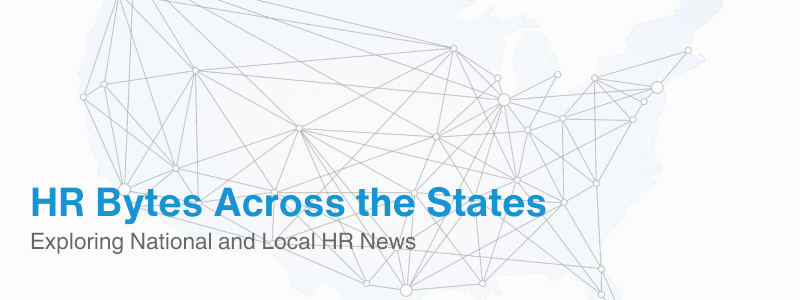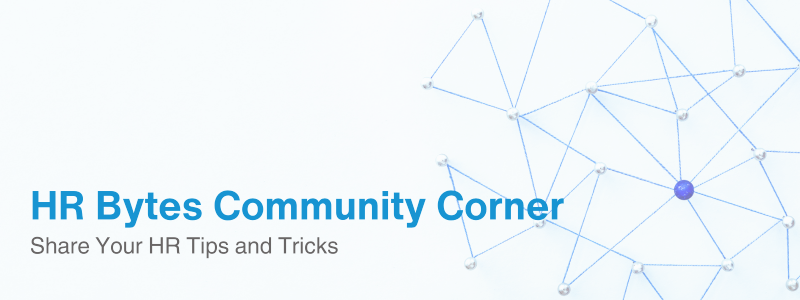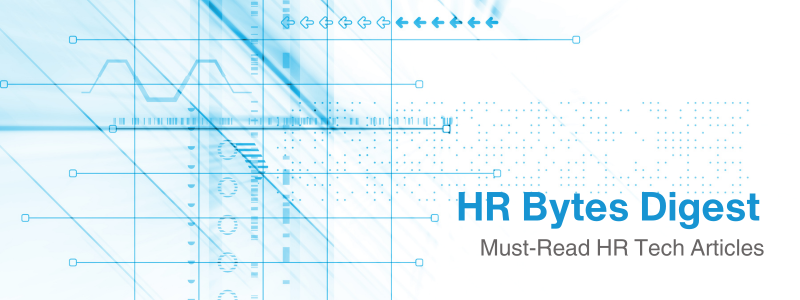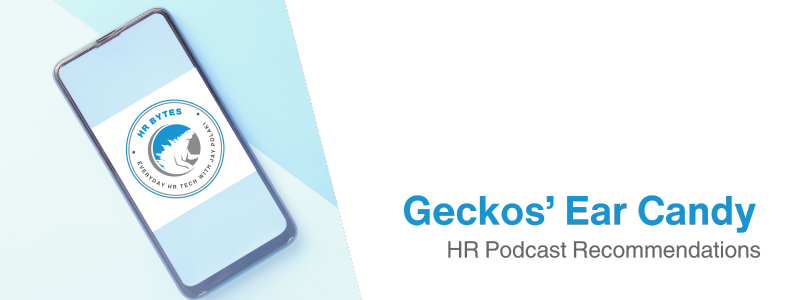HR BYTES NEWSLETTER
May 2024

Welcome to a new month and all the energy that a new month brings! In the May issue, we explore a diverse range of topics, from the global impact of AI regulations to the evolving landscape of workplace flexibility laws. But wait, there's more! We're peeling back the layers on how AI is transforming HR practices, turning mundane tasks into Monday morning victories, and redefining the way we connect with employees. Join us on this journey as we explore the latest innovations, challenges, and opportunities in the dynamic world of HR. Let's continue to learn, adapt, and thrive together in shaping the future of work.

What the EU AI Act means for HR
The European Union's AI Act aims to regulate the development and deployment of artificial intelligence (AI) in a responsible manner. It focuses on balancing the benefits of AI with potential risks, particularly concerning vulnerable populations and societal well-being. The Act provides guidelines for AI usage, but there are concerns about its impact on innovation and the cost of compliance for businesses. Additionally, it highlights the global significance of AI regulation and emphasizes the need for organizations to govern AI use responsibly, especially in HR processes.
U.S., U.K. Announce Partnership to Safety Test AI Models
The U.S. and U.K. have joined forces to enhance the safety testing of powerful artificial intelligence (AI) models. This partnership, led by government officials from both countries, aims to develop a common approach to AI safety testing and share vital information about AI capabilities and risks. The agreement formalizes collaboration between the U.S. and U.K. AI Safety Institutes, which were established to address growing concerns about the safety and security of AI technologies. By working together, the U.S. and U.K. governments hope to mitigate the risks associated with rapidly advancing AI systems and promote international cooperation on AI safety.
AI is Transforming HR at Small to Medium Businesses
The newest tech can automate workflow, help identify employees at risk of leaving and more, writes HR Geckos’ CEO Jay Polaki in Technical.ly’s latest edition. Artificial intelligence tools are revolutionizing our workplaces so quickly that it’s comparable to the printing press.
AI helps HR professionals by automating mundane tasks, allowing them to focus on strategic initiatives and fostering meaningful employee relationships. Contrary to fears of AI replacing human roles, it complements HR functions, providing insights and capabilities to improve operations.
Especially in small to medium businesses, where HR teams often wear multiple hats and resources are limited, AI integration offers a transformative opportunity to streamline operations, enhance employee experiences, and drive organizational success.

Every US Federal Agency Must Hire a Chief AI Officer
The US government is taking steps to ensure that artificial intelligence (AI) is used responsibly in federal agencies. Now, every federal agency must appoint a chief AI officer to oversee the use of AI systems and establish AI governance boards to coordinate their use. This move aims to make sure AI in public service remains safe. Agencies will also have to report annually on the AI systems they use and any associated risks. The government plans to hire 100 AI professionals by the summer to help with these efforts. Additionally, agencies must ensure that AI systems meet safeguards to prevent discrimination and provide transparency to the public. While the US still lacks specific laws regulating AI, this new guidance aims to set standards for government agencies using AI technology.
The U.S. Citizenship and Immigration Services (USCIS) has announced new guidance related to Form I-9, Employment Eligibility Verification.
The U.S. Citizenship and Immigration Services (USCIS) recently addressed common questions about acceptable documents for Form I-9, which verifies employment eligibility. Specifically, they paid special attention to a group of documents known as List C #7 documents. To enhance understanding, USCIS added pictures of these documents and additional information about their acceptability. You can now easily find these details on the official USCIS website and in the employer handbook called the M-274. This positive change streamlines the process, ensuring both employers and workers know which documents are valid when completing the Form I-9.
California Law would give Employees the 'Right to Disconnect' during Nonworking Hours
California is considering a new law called the "right to disconnect," which would give employees the freedom to disconnect from work emails and calls during their nonworking hours. Assemblymember Matt Haney introduced the bill, aiming to protect employees from being constantly reachable outside of their scheduled work time. If passed, California would be the first state in the U.S. to implement such a law, following the lead of several other countries. The proposed law would define nonworking hours and require employers to establish policies allowing employees to disconnect. While the bill is still under review, it reflects growing concerns about work-life balance and employee well-being.

How ready is your organization for a future transformed and led by GenAI? This question has been top of mind for all business and HR leaders for the past year. We are in the early stages of a revolution, and now is the best time to delve into the readiness of organizations to embrace this revolutionary technology.
As a business leader, there are several perspectives to consider when assessing your organization's readiness to implement GenAI tools and processes.
Leadership Readiness: It's crucial for leaders to educate themselves on the impact that GenAI will have on every facet of their business before diving in.
Strategic Integration: A Needs Assessment should be done prior to integrating new GenAI tools to ensure that the gaps in the organization's data and tech stack are readily addressed.
Workforce Transformation: Providing a sandbox environment for skill development and practice is crucial to ensure that the training mechanism for the entire workforce is in place before any GenAI integration.
Financial Foresight: It's important to understand the financial commitments required to bring GenAI to an organization, as this is not a cost-effective tool for many businesses today.
Ethical Considerations: The ethical and compliance challenges of GenAI are many, making it crucial to have ethical guardrails with appropriate governance mechanisms in place in the organization.
Five Practical Tips for HR Professionals Incorporating AI into Their HR Function
The implementation of AI in HR must be approached thoughtfully to maximize benefits and minimize potential pitfalls. Here are five practical tips for HR professionals looking to effectively incorporate AI into their HR functions:
Define Clear Objectives: Before integrating AI into your HR processes, it's crucial to have a clear understanding of what you aim to achieve. Identify specific challenges within your HR operations that AI can help address. Whether it's improving the recruitment process, enhancing employee engagement, or streamlining payroll and administrative tasks, having well-defined goals will guide your AI implementation strategy and help measure its effectiveness.
Choose the Right Tools: Not all AI solutions are created equal, and choosing the right one can make a significant difference. Assess various AI tools to determine which best fits your HR needs. Consider factors such as ease of integration with existing systems, user-friendliness, and the specific functionalities that address your objectives.
Ensure Ethical Use of AI: AI in HR must be managed with a strong ethical framework to avoid biases that can affect hiring, promotions, and employee evaluations. Establish guidelines that promote fairness, transparency, and accountability in AI implementations. Encouraging ethical AI use not only enhances trust among employees but also helps in complying with legal standards.
Educate and Train Your Team: For AI to be successfully integrated into HR, your team must understand and be comfortable using the technology. Provide training sessions that cover how AI tools work and the best practices for using them. This training should also address any apprehensions about AI, clarifying how it complements their roles rather than replacing them.
Monitor and Evaluate AI Performance: Continuous monitoring and evaluation are essential to ensure it meets your HR objectives. Set up metrics to assess the effectiveness of AI tools in achieving desired outcomes and identify areas for improvement. Regular feedback from employees and managers who interact with these AI systems can provide practical insights into their performance and impact.
What other perspectives would you add to the above? Let's continue the conversation on the readiness of organizations for a future transformed and led by AI. Write to us at info [at] hrgeckos dot com.

How to Decide If AI Should Be Part of Your Growth Strategy
The importance of considering AI as part of your business growth strategy. It starts by highlighting the unpredictability of technological trends and the need to carefully evaluate whether AI aligns with your company's goals. It suggests that businesses should carefully assess whether AI fits into their growth plans by considering factors such as the definition of AI's role, the availability of suitable technology, access to necessary resources, the scale of implementation, and execution capabilities. The decision to integrate AI should be based on a thorough analysis of potential benefits and risks, considering factors like technology readiness, talent availability, and organizational culture. Ultimately, the article advises that the decision to adopt AI should be informed by its alignment with the business strategy and the potential to drive growth. It suggests that by following the outlined steps, businesses can make informed decisions about whether AI is the right fit for their growth trajectory.
As HR is Asked to ‘Do More with Less,’ How GenAI can Make it Possible
HR teams are facing increasing pressure to handle more tasks with limited resources, especially amidst uncertainties like economic slowdowns and talent shortages. A recent survey by The Hackett Group suggests that HR professionals see generative artificial intelligence (gen AI) as a solution to enhance efficiency and effectiveness. Gen AI shows promise in reducing costs and staff while increasing productivity, with some HR organizations already implementing pilots or small-scale deployments. As HR workloads continue to rise, particularly exacerbated by the challenges of the pandemic, gen AI offers opportunities to streamline processes, improve operations, and provide valuable insights through data analysis. By leveraging gen AI, HR can do more with less, optimizing tasks like talent acquisition and improving overall productivity across different roles and functions.
What is a Chief AI Officer — and Do You Need One?
The emerging role of Chief AI Officers (CAIOs) in companies as AI technology becomes more prevalent in business operations. It explains that while not every organization may need a CAIO at the C-suite level, the role is becoming more common, with a focus on aligning AI strategy with business objectives. The article highlights the skills required for a CAIO, including technical expertise in AI and leadership abilities to collaborate across departments. It also explores alternative titles, such as Vice President of AI, and emphasizes the importance of finding candidates with expertise in AI, machine learning, and leadership. Overall, it suggests that companies should consider the need for AI expertise at executive levels to drive successful AI initiatives.
The Top 20 AI Uses HR Needs to be Considering Today
The 20 practical applications of artificial intelligence (AI) across various business domains, particularly focusing on its role in human resources (HR). It highlights how AI is transforming HR processes, including candidate acquisition, interviewing, onboarding, employee engagement, and communication strategies. Additionally, it explores AI's impact on data intelligence, business optimization, and security measures. The article emphasizes the need for HR executives to stay informed about AI legislation and to leverage AI technologies to drive growth, efficiency, and innovation in their organizations. Overall, it underscores the importance of embracing AI as a strategic imperative for staying competitive in today's business landscape.
AI and Humans: Not a Competition, but a Collaboration
The impact of artificial intelligence (AI) on businesses emphasizes the importance of viewing AI as a collaboration with humans rather than a competition. It highlights how AI can automate repetitive tasks, provide valuable insights, and improve efficiency in areas like talent acquisition. However, it also emphasizes that AI has limitations and cannot replace human qualities like emotional intelligence and creativity. Integrating AI into businesses, including investing in employee upskilling, nurturing a culture of adaptability, ensuring technology supports human-AI collaboration, and building a supportive ecosystem. Overall, it emphasizes that AI is a tool that can elevate human capabilities rather than replace them, leading to greater business success through collaboration between AI and humans.
How to Handle Culture Change and the AI Boom, from HR Leaders at AWS, Microsoft
The exploration dives into the current landscape for HR leaders, focusing on two key areas: culture change and the integration of AI technology. In 2024, businesses are prioritizing the development of resilient organizational cultures and sustainable growth strategies, particularly in light of the potential disruptions caused by advancements in AI technology. Many companies view AI, particularly generative AI, as a catalyst for transformative change, with HR leaders playing a crucial role in facilitating this transition. Amidst this uncertainty, HR executives are faced with the challenge of redefining productivity metrics while simultaneously managing the day-to-day tasks that demand immediate attention. To navigate these challenges, many CHROs seek guidance from their professional networks and industry peers. Insights from HR executives at companies like Microsoft and Amazon emphasize the significance of cultural health, the positive effects of AI on productivity, and the need for HR to lead organizational change effectively.


We're tuning in to the HR Mixtape Podcast with host Shari Simpson this month. This podcast covers a wide range of topics, featuring captivating interviews with industry leaders, invaluable compliance tips, laid-back coffee chats with HR trendsetters, and the freshest updates in the world of HR.

Of course, we are excited for Season 4 of our very own HR Bytes,
where we share stories of HR trailblazers who are redefining HR with a global mindset and local impact. Tune in to our latest Season 4, with Angela Cheng-Cimini, CHRO at Harvard Business Publishing, on your favorite podcast channel and YouTube.
Check out our most recent conversations on your favorite podcast channel or YouTube! https://hrgeckos.com/podcast.html.

We found some new reads to stay ahead of HR and the future of work trends! What is on your HR bookshelf this month?

The Fast Future Blur: Discover Transformative Interconnections Shaping the Future by Nitin Rakesh (Author) (May 2024)

The Talent Fix Volume 2: A Leader's Guide to Recruiting Great Talent by Tim Sackett (April 2024)

Co-Intelligence: Living and Working with AI By Ethan Mollick (April 2024)

Creepy Analytics: Avoid Crossing the Line and Establish Ethical HR Analytics for Smarter Workforce Decisions by Salvatore V. Falletta (April 2024)
Curious about the future of HR tech?
Dive into the future with our HR Bytes Newsletter, your source for cutting-edge HR Tech insights
We’re thrilled to share our HR Bytes Sticker!
Be part of the HR Bytes community.
Share your thoughts and claim your sticker here: https://tinyurl.com/3a4ecx62
Stay tuned, stay inspired!

HR Professionals, as you set sail into May, steer smoothly with a compliant course. Take a moment to review your checklist and mark key dates for a successful and comfortable month ahead!
May 1 - Quarterly Form 941 is due
May 1 - Quarterly Form 720 is due
May 15 - Non-Profit Tax Returns due, including Form 990
IRS Form 990: Report activities annually for organizations exempt from income tax.
May is Asian American and Pacific Islander (AAPI) Heritage Month. How are you celebrating? Do you call it AAPI month or APIDA month? Here’s some information on this heritage month from Southern Illinois University Edwardsville.

We asked HR practitioners how to strike a balance between technology and keeping people at the forefront of their decisions. Here’s Heather Weidkamp’s take on it!
"I believe you have to start by thinking of the ways the technology will affect the users. What changes will there need to be to processes or "the way things have always been done". The easiest way to overcome an objection is to preemptively answer it so if you come to your employees with well thought out FAQs and/or examples during the introduction it will decrease the initial shock. How will this affect them (good and bad)? What is the reason for this technology? What is the expected ROI? The more transparency and education you can provide will let the people know that you care about them."
Have an HR Byte to Share? Write to us at info[at]hrgeckos[dot]com


